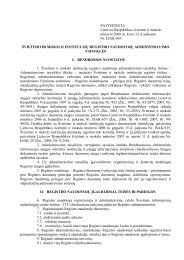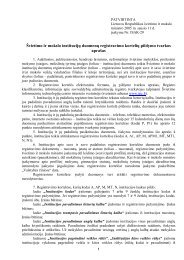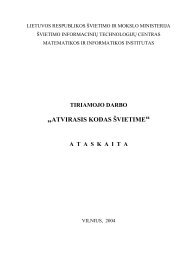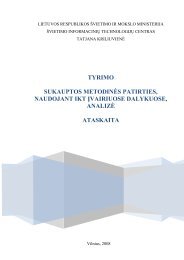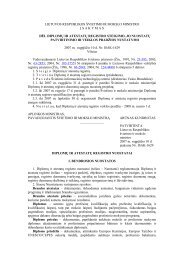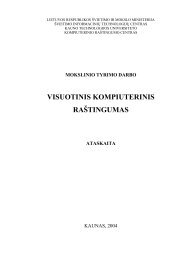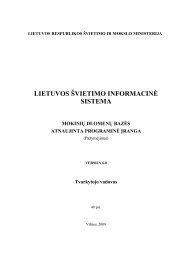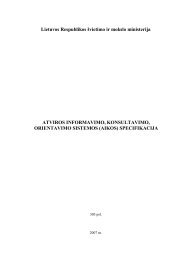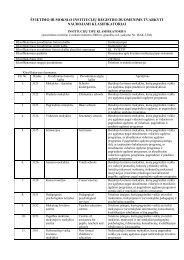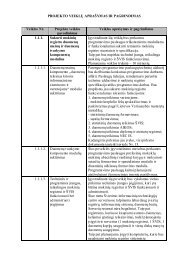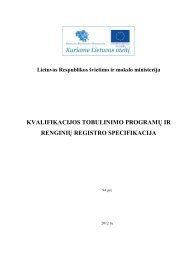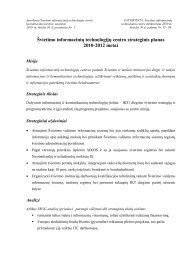A T A S K A I T A - Švietimo informacinių technologijų centras ...
A T A S K A I T A - Švietimo informacinių technologijų centras ...
A T A S K A I T A - Švietimo informacinių technologijų centras ...
You also want an ePaper? Increase the reach of your titles
YUMPU automatically turns print PDFs into web optimized ePapers that Google loves.
Įvairių šalių IKT diegimo patirties analizė7. ŠALTINIAIADL. Advanced Distributed Learning network web site. Available: http://www.adlnet.org/Anderson, J., Weert, T. et al.(Eds.).: Information and Communication Technology in Education.UNESCO, Paris, 2002.ARIADNE. The Alliance of Remote Instructional Authoring and Distribution Networks forEurope. Available: http://www.ercim.org/publication/Ercim_News/enw33/forte.htmlAshby, J., General Teaching Council for England Survey of Teachers 2004-06 Report on trenddata. April 2007. General Teaching Council for England, 2007. URL:http://www.gtce.org.uk/shared/contentlibs/126795/93128/126346/207305/trend_rpt.pdfBalanskat A. Assessment Schemes For Teachers' ICT Competence. European Schoolnet,Brussels, 2005. http://www.eun.org/Balanskat, A., Blamire, R., Kefala, S. The ICT Impact Report. Abstract. 1, December, 2006.Blamire R., Balanskat A. Equipped, trained… and now what? European Schoolnet, Brussels2002. http://www.eun.org/Bitinas B. Edukologinis tyrimas: sistema ir procesas. Vilnius: Kronta, 2006.Becta. The ICT and e-learning in FE survey 2006.Brazdeikis, V. Educator‘s ICT Competency and possibilities of Comenius project. In S. Kurki,P. Pirhonen (Eds.), Comp@ct – Connecting Comenius Schools. Jyvaskyla: Institute for EducationalResearch, 2004, 54– 61.Brazdeikis V. Pedagogo informacijos ir komunikacijos technologijos taikymo kompetencija.Informacijos mokslai, 34, 2005, 43–50.Brazdeikis V. Pedagogų informacinių ir komunikaciniųtechnologijų taikymo kompetencija ir jos vertinimo strategija, 2007 (daktaro disertacija).Brazdeikis V. Pedagogo kompetencija, informacinių ir komunikacinių technologijų diegimasšvietime. Informacijos mokslai. 26, 2003, 29–35.Brazdeikis, V.: The model of Educator‘s ICT Competence: the possibilities and limitation of itsimplementation. ECER, Dublin, (2005) http://www.eera.ac.uk/Brereton, P.; Budgen, D.; Bennett, K.; Munro, M.; Layzell, P.; Macaulay, L. The Future ofSoftware: Defining the Research Agenda. Communications of the ACM, vol. 42, 2000Britain, S., Liber, O. A Framework for the Pedagogical Evaluation of eLearning Environments.2004. URL: http://www.cetis.ac.uk/members/pedagogy/files/4thMeet_framework/VLEfullReportButt S., Cebulla A. E-maturity and school performance – A secondary analysis of COLevaluation data. London: National Centre for Social Research, 2006.CALIBRATE (Calibrating eLearning in Schools). Specific Targeted Research Project, IST call4, Priority 2.4.13 Strengthening the Integration of the ICT Research Effort in an Enlarged Europe,Proposal part B, 2005.Carr, Jo Ann: Information Literacy and Teacher Education. ERIC Clearinghouse (1998)http://www.ericdigests.org/Carrucan, T., Crewe,T., Matthews, E. & Matthews, S. The internet manual for teachers,Macmillan, Cpt. 9, 1998.151



